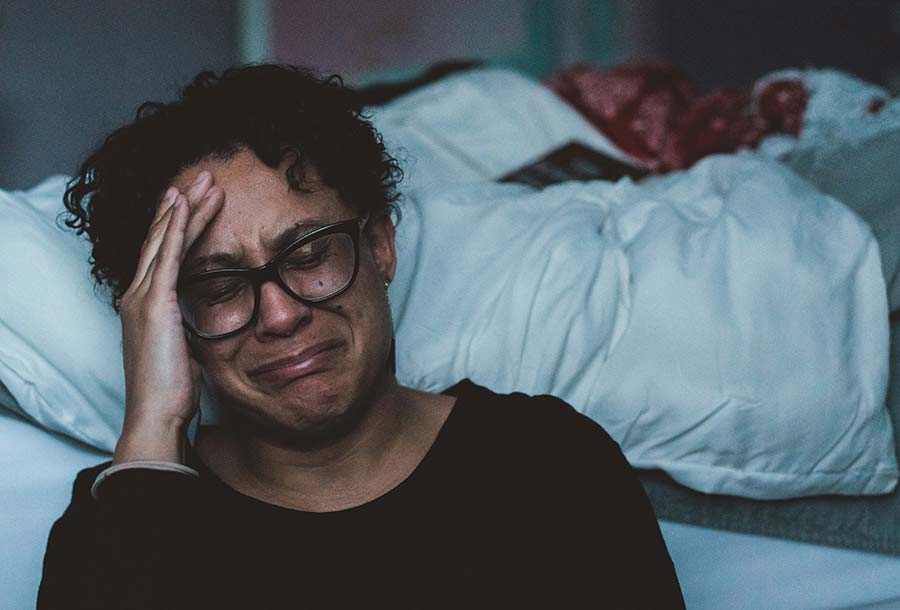Reviewed by Phillip Waite, Ph.D.

Medicine is not an exact science. When you have several doctors and specialists review your test results and health records to arrive at the same conclusion, you’d think that it would be easier to accept the diagnosis. Also, when you are dealing with a chronic condition that has remissions and flares, it’s easy to forget and overlook your new limits. It is not easy to accept or live with a chronic illness. Every day is a constant reminder of a former life.
When I was first diagnosed with Fibromyalgia and more recently Sjogren’s Syndrome, I was not happy at the thought of being sick. I was furious and failing at getting control of the constant pain and fatigue. It never occurred to me that grieving the diagnosis and my former life was real until I found myself spontaneously breaking down and having anxiety attacks. When first diagnosed, I couldn’t help but tell myself it was a mistake and I questioned my body, my doctor, and my treatments. I thought I was stronger than this condition and I could beat it, I just needed to stop focusing on it. As time went on, I became stuck in a denial loop.
On low pain/fatigue days, I would try to do everything I could, only to hit a brick wall in agony, depression and defeat. It is easy to get stuck in an endless cycle if you let your grief and chronic illness spiral out of control.
Chronic Illness Is Not the End
One reaction that is not always apparent or expected after receiving a chronic illness diagnosis is grief. It’s perfectly acceptable for you to mourn the loss of your normal health and routine. Many people who suffer from chronic health conditions feel sad they can no longer enjoy their former way of life. While it is normal, grieving for too long can interfere with oneandrsquo;s ability to move past their emotional suffering and learn effective coping mechanisms.
Grief is not exclusive to death. Any time someone loses someone or something valuable and vital to his or her life, they may experience sadness and mourning. In terms of chronic illness, I found myself bouncing between anger, depression, anxiety and denial.
Grief Is a Manageable Process
There are five stages of grief andndash; anger, denial, depression, bargaining and acceptance. It is not always easy to recognize when you are going through these stages. It’s important for anyone who is suffering from a long-term illness to identify what he or she is struggling with and know when it is beneficial to reach out for help.
Grief and chronic illness can be managed with medications and lifestyle changes and a new outlook on life. As I thought about everything I had to give up because of my diagnosis, it became more apparent I was no longer the person I once was. Chronic illness can bring about a loss of self, function and status. But it does not have to mean “game over.”
Grief Leads to Acceptance and Freedom
It’s not always easy adjusting to chronic illness. But it’s not impossible either. At first, I couldn’t understand how people who were experiencing the same or similar health issues were still able to find happiness, acceptance and confidence. It wasnandrsquo;t until I realized I could not achieve a similar outcome if I kept feeling sorry for myself that I accomplished the same goals.
First, I had to accept my reality: I have a chronic illness. Next, I had to identify my feelings and come to terms with them to reinvent myself. Just because I have a chronic disease doesn’t mean that life is over andndash; it’s just different. I can still do many of the things I used to enjoy as long as I pace myself, change my routines, and listen to my body more closely. I had to learn my limitations and trust my support team.
People come and go. Friends that you thought might follow you all through life may disappear. This can be a blessing in disguise. My circle is small, but it is full of friends, family and colleagues who accept my chronic illnesses. When I am suffering from flares or experiencing difficulty in getting something done, they are understanding and accommodating.
I encourage anyone who is experiencing ongoing illness and pain to look in the mirror every day and say several times, “I am not my illness. I am strong. Chronic illness does not define me.” It’s true, you may not be able to do everything you once dreamed of as soon as you want to, but with careful preparation, it is possible. You don’t have to surrender your dreams and goals, but you may need to make adjustments and once you do, youandrsquo;ll finally be able to live life on your own terms.
Everyone’s struggle with chronic illness and grief is different. It’s up to you to learn healthy mechanisms for coping with chronic illness so you can take back the power your illness has taken from you. The first step is believing in yourself, strengthening your mind, and deciding that you will not allow your condition and accompanying grief keep you captive any longer.
Did you find this article helpful? Join us at HealingWell for support and information about your condition. Connect and share with others like you.




